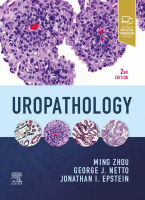Physical Address
304 North Cardinal St.
Dorchester Center, MA 02124

Definition Inability to identify residual cancer in the final surgical specimen, despite complete sampling in patients undergoing radical prostatectomy for biopsy-confirmed prostate carcinoma Clinical features You’re Reading a Preview Become a Clinical Tree membership for Full access and enjoy Unlimited…

Prostate cancer genetics Prostate carcinoma is a multifactorial disease influenced by both environmental and genetic factors. Positive family history is the strongest epidemiological risk factor after advancing age and ethnic background. Prostate carcinoma can be divided into three groups: hereditary,…

Definition The objective of staging is to group malignancies with a similar prognosis and therapeutic approach to be able to compare clinicopathologic data on a homogeneous patient population. Staging involves determining the anatomic extent or spread of prostate cancer at…

You’re Reading a Preview Become a Clinical Tree membership for Full access and enjoy Unlimited articles Become membership If you are a member. Log in here

You’re Reading a Preview Become a Clinical Tree membership for Full access and enjoy Unlimited articles Become membership If you are a member. Log in here

Definition Cryosurgical ablation refers to rapid deep freezing of the prostate gland. Multiple cryoprobe needles filled with circulating liquid nitrogen transform the prostate into an ice ball. Cryoablation results in substantial tissue destruction and death of benign and malignant cells.…

Definition Androgen deprivation therapy is a popular form of treatment for prostate cancer. Androgen deprivation can be achieved with multiple methods: Orchiectomy Estrogen Gonadotropin-releasing hormone antagonists (luteinizing hormone–releasing hormone [LH-RH] agonists) Anti-androgen 5α-reductase inhibitors Agents are used for preoperative tumor…

Definition The primary effect of radiation therapy is the damage of endothelial cells, which causes ischemia that leads to atrophy. Radiation-induced changes on prostatic tissue are variable, more severe, and durable when delivered as interstitial seed implants (brachytherapy) than by…

Definition Focus of high-grade prostatic intraepithelial neoplasia (HGPIN) with adjacent small atypical glands, suggestive of, but not diagnostic for, prostatic adenocarcinoma (PINATYP) Clinical features You’re Reading a Preview Become a Clinical Tree membership for Full access and enjoy Unlimited articles…

Definition Small focus of atypical glands suggestive of, but not diagnostic for, low-grade prostatic adenocarcinoma Clinical features You’re Reading a Preview Become a Clinical Tree membership for Full access and enjoy Unlimited articles Become membership If you are a member.…